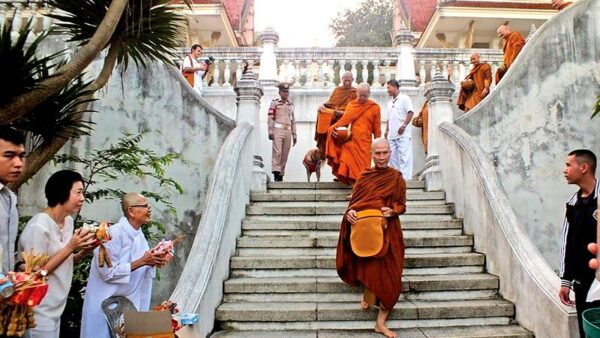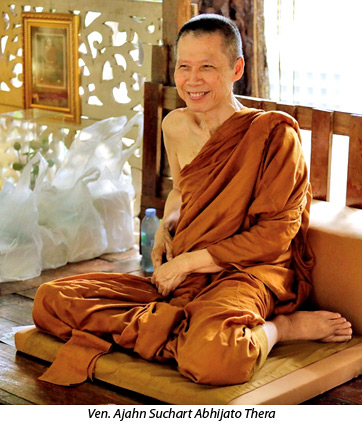Remain calm, accept things as they come ‘Remember, we all die’ – By SAMANGIE WETTIMUNY

Source:sundayobserver.lk
Following are excerpts from an interview with Theravada Bhikkhu and renowned meditation guru Venerable Ajahn Suchart Abhijato Thera of Thailand.

Q: Sri Lankans are undergoing a difficult period at the moment with constant strikes, protests, constant fuel, and essential commodity shortages affecting their daily lives in a bad manner. The minds of the people are disturbed. What advice do you have to offer to these people? How can they maintain their mental balance? Please advise.
A: Just look at other countries such as Ukraine that are in a worse shape than yours. People in Ukraine suffer more than anyone else. So if you can see things in a balanced manner, you will realise that the problems you are facing at the moment are not that bad. You better use your wisdom. That’s the way life is.
 You just have to see it in the light of the Three Characteristics of Existence – anicca- changing from good to bad and from bad to good, anatta, (it is the work of nature and is something that we cannot intercept or interfere, so we just have to learn to live with it.) And then there will be no suffering or Dukkha.
You just have to see it in the light of the Three Characteristics of Existence – anicca- changing from good to bad and from bad to good, anatta, (it is the work of nature and is something that we cannot intercept or interfere, so we just have to learn to live with it.) And then there will be no suffering or Dukkha.
But if we want to change the situation or if we want to go back to what it used to be when everything had been in good shape, then we can only expect more suffering/Dukkha because we cannot go back to that original state. We have to live with the present situation. So as meditation practitioners we teach the mind to remain calm, to remain in equanimity, and to accept things as they come.
However, that does not mean that we don’t do anything to make our situation better. We will try to do the best we can. Hope for the best, but we have to expect the worst. And then only we will not feel so bad. If we think of somebody who is in a worse shape than we are – somebody who is blind, somebody who is handicapped, who is sick for instance – then we will be able to see things in a more balanced way.
Q: In society, we come across different types of people. From envy to hatred we become victims of other people’s uncontrolled emotions. What is the best way to handle such people?
A: Just Like the way you handle nature, I guess! Or just like the way you deal with the weather. You cannot change the changing nature of the weather. Sometimes it can be hot, sometimes it can be cold. Sometimes it can be wet, or sometimes it can be dry. We learn to live with these things. So it’s the same way with people.
 According to Buddhism, people are a work of nature like the weather. So we just have to learn to take them as they come. Don’t try to change it. Try to adapt to these situations. Adjust yourself, so that you don’t react emotionally. Simply know them for who/what they are.
According to Buddhism, people are a work of nature like the weather. So we just have to learn to take them as they come. Don’t try to change it. Try to adapt to these situations. Adjust yourself, so that you don’t react emotionally. Simply know them for who/what they are.
Q: The four stages of awakening are Sotāpanna, Sakadāgāmi, Anāgāmi, and Arahant. Could you elaborate on each stage and their achievements?
A: These four stages of awakening require one to get rid of the Ten Fetters.
A Sotapanna has got rid of the first three fetters – of sakkaya ditthi, sīlabbata-parāmāsa, and Vichikichcha (or doubt in the Buddha, Dhamma and Sangha)
A Sakadagami is a person who has been able to lessen the bad effects of two more fetters – namely Raga –(sexual desire) and Pathika ( feeling of unsatisfaction). But he has not been able to eliminate these two fetters.
At the third stage of Enlightenment – Anagami one can completely eliminate the Raga and Pathika.
The fourth stage of awakening requires you to remove the remaining five fetters of Rupa raga, Arupa raga – attachment or enjoyment in the Rupa jana and Arupa jana – and restlessness arising from practising too hard, too much contemplation until the mind starts to become restless and agitated. The next is getting rid of ‘the Self.’ And the last one is the ability to completely/ truly see the four Noble Truths in every instance.
These are the ten fetters one requires to get rid of to become Enlightened. So if you want to study further just search for the Ten Buddhist fetters.
You need the practice of morality, meditation – Samadhi or the practice of Vipassana or wisdom- to be able to remove the ten fetters from your mind.
Q: Does one have to become an arahant to be free from desires (sexual desires in particular) altogether or until which stage (Sotāpanna, Sakadāgāmi, Anāgāmi, and Arahant) does one have sexual desires?
A: You have to be an Anagami to become totally free from sexual desires. If you can see the reality of the body – as something unpleasant or simply as a corpse all the time -then your sexual desire will gradually disappear from your mind.
A Sotapana and Sakkuddagami still have sexual desire in them. A Sakkuddagami has it to a lesser degree than a Sotapanna. An Anagami and Arhant, both have no sexual desires left in their mind.
Q: Many people in Sri Lanka are uncertain about their future, given the bad financial crisis in the country. How should one get ready to face a bad crisis like this?
A: By contemplating on Death to a great extent. Eventually, we all are going to die. So it does not matter what happens in this world. Whether it is good or bad, eventually everybody will lose everything anyway. We all will have to die one day, sooner or later.
This is something that we keep forgetting. If you are constantly contemplating that, then you will not feel bad or sad about the present situation and you will try to work as best as you can. So it is best to take everything as it comes. Death contemplation can be helpful to remind us of the true situation of our life.
We are all subjected to aging, sickness and death. This is considered to be natural and no one can avoid this truth.
Q: What is the Buddha’s advice on house management/ monetary management during difficult times?
A: Try to economize your expenses. Try to reduce your expenses. Spend only on the essentials and give up the non-essentials. Then you will have fewer expenses and will not face an acute monetary problem.
(Ven. Ajahn Suchart Abhijato Thera was born on November 2, 1947. Having completed his degree in Civil Engineering at California State University, Fresno, USA, he returned to his motherland where he designed an ice cream parlour for a brief stint. Quite soon, inspired by a Dhamma Book, he decided to go in search of ‘true happiness’, to find inner peace through the practice of Buddhist meditation.
He became a Buddhist bhikkhu at the age of 27 and received ordination at Wat Bovornives in Bangkok on February 19, 1975, with Somdet Phra Ñanasarivara, the late Supreme Patriarch (Somdet Phra Sangharaja), as his preceptor.
Ven. Ajahn Suchart Abhijato Thera resides in Wat Yansangwararam, Thailand.)







